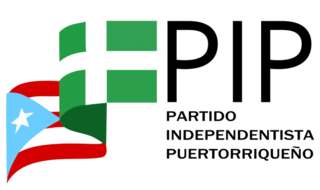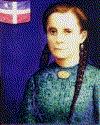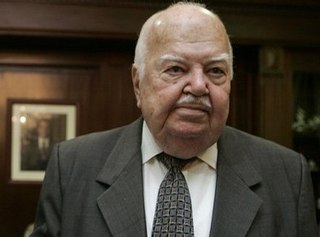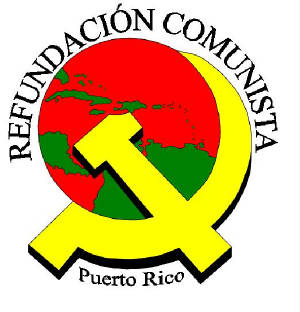Related Research Articles
The Fuerzas Armadas de Liberación Nacional was a Puerto Rican clandestine paramilitary organization that, through direct action, advocated independence for Puerto Rico. It carried out more than 130 bomb attacks in the United States between 1974 and 1983, including a 1975 bombing of the Fraunces Tavern in New York City that killed four people.

The Puerto Rican Independence Party is a social-democratic political party in Puerto Rico that campaigns for the independence of Puerto Rico from the United States.

The Puerto Rican Socialist Party was a Marxist and pro-independence political party in Puerto Rico seeking the end of United States of America control on the Hispanic and Caribbean island of Puerto Rico. It proposed a "democratic workers' republic".

José de Diego y Martínez was a Puerto Rican statesman, journalist, poet, lawyer, and advocate for Puerto Rico's political autonomy in union with Spain and later of Puerto Rican independence from the United States who was referred to by his peers as "The Father of the Puerto Rican Independence Movement".

Grito de Lares, also referred to as the Lares revolt, the Lares rebellion, the Lares uprising, or the Lares revolution, was the first of two short-lived revolts against Spanish rule in Puerto Rico, staged by the Revolutionary Committee of Puerto Rico on September 23, 1868. Having been planned, organized, and launched in the mountainous western municipality of Lares, the revolt is known as the Grito de Lares . Three decades after rebelling in Lares, the revolutionary committee carried out a second unsuccessful revolt in the neighboring southwestern municipality of Yauco, known as the Intentona de Yauco(The Attempted Coup of Yauco). The Grito de Lares flag is recognized as the first flag of Puerto Rico.

Lola Rodríguez de Tió was the first Puerto Rican-born woman poet to establish herself a reputation as a great poet throughout all of Latin America. A believer in women's rights, she was also committed to the abolition of slavery and the independence of Puerto Rico.

Mariana Bracetti Cuevas was a patriot and leader of the Puerto Rico independence movement. In 1868, she knitted the Grito de Lares flag that was intended to be used as the national emblem of Puerto Rico in its first of two attempts to overthrow Spanish rule, and to establish the island as a sovereign republic. As the flag of the Grito de Lares revolt, Bracetti's creation became known as the Bandera del Grito de Lares , most commonly known as the Bandera de Lares . Today, the flag is the official flag of the municipality of Lares, Puerto Rico.

Throughout the history of Puerto Rico, its inhabitants have initiated several movements to gain independence for the island, first from the Spanish Empire between 1493 and 1898 and since then from the United States. Today, the movement is most commonly represented by the flag of the Grito de Lares(Cry of Lares) revolt of 1868.
Francisco Ramírez Medina, was one of the leaders of "El Grito de Lares", the first major revolt against Spanish rule and call for independence in Puerto Rico in 1868. He has thus far been the only person to be named "President of the Republic of Puerto Rico".

Juan Antonio Corretjer Montes was a Puerto Rican poet, journalist and pro-independence political activist opposing United States rule in Puerto Rico.

Juan Mari Brás was an advocate for Puerto Rican independence from the United States who founded the Puerto Rican Socialist Party (PSP). On October 25, 2006, he became the first person to receive a Puerto Rican citizenship certificate from the Puerto Rico State Department. His son, Santiago Mari Pesquera, was assassinated by a suspected far-right activist in 1976. In 2009, documents revealed the FBI had known of a plot to assassinate Mari Brás but did not share the information with him.
Olga Isabel Viscal Garriga was a public orator and political activist. Born in Brooklyn, New York, she moved to Puerto Rico, where she was a student leader and spokesperson of the Puerto Rican Nationalist Party's branch in Rio Piedras. As an advocate for Puerto Rican independence, she was sentenced to eight years in a U.S. federal penitentiary, for refusing to recognize the sovereign authority of the United States over Puerto Rico.

The Socialist Front is a coalition of far-left and pro-independence political organizations in Puerto Rico. The Socialist Front also includes non-partisan activists.
The Hostosian National Independence Movement is a political organization in Puerto Rico. In 2015, Julio Muriente was its leader.

The Socialist Party, also known as Socialista Obrero, was a pro-statehood political party in Puerto Rico, that also contemplated independence in the case that entry into the American Union was denied by Congress. The party was concerned with improving the social welfare of Puerto Ricans.

The Union of Puerto Rico, also known as the Unionist Party, was a major political party in Puerto Rico in the early 20th century. The Union of Puerto Rico was known as the dominant political party of the island from 1904 to 1932. UPR founder Luis Muñoz Rivera also founded La Democracia, which effectively acted as the UPR publication. On 19 February 1904, the Union of Puerto Rico party became the first mass party to advocate for independence for Puerto Rico in the form of a sovereign nation.

The Intentona de Yauco of March 24–26, 1897 was the second and final short-lived revolt against Spanish rule in Puerto Rico. It was staged by the pro-independence Revolutionary Committee of Puerto Rico in the southwestern municipality of Yauco, 29 years after the first unsuccessful revolt, known as the Grito de Lares(Cry of Lares). During the Intentona de Yauco, the current flag of Puerto Rico was flown on the island for the first time.

The Workers' Socialist Movement is a Puerto Rican democratic socialist revolutionary organization, formed in 1982 and dedicated to the self-organization and self-emancipation of the working-class in Puerto Rico, as well as international solidarity with the workers struggles worldwide. It is usually known as the "MST", and its youth section is the Unión de Juventudes Socialistas, also known as the "UJS-MST" or simply "UJS". The MST supports a socialist and independent Puerto Rico.

Leopoldo Figueroa a.k.a. "The deacon of the Puerto Rican Legislature", was a Puerto Rican politician, journalist, medical doctor and lawyer. Figueroa, who began his political career as an advocate of Puerto Rican Independence, was the co-founder of the "Independence Association", one of three political organizations which merged to form the Puerto Rican Nationalist Party. Figueroa, had changed political ideals and in 1948, was a member of the Partido Estadista Puertorriqueño. That year, he was the only member of the Puerto Rico House of Representatives who did not belong to the Partido Popular Democrático (PPD), and the only Representative to oppose the PPD's approval of what became known as the Ley de la Mordaza, which violated the civil rights of those who favored Puerto Rican Independence. On December 22, 2006, the Puerto Rican Legislature approved a law declaring every September 21, Leopoldo Figueroa Carreras Day.
References
- ↑ "Marxist-Leninists Unite!, Puerto Rico". www.marxists.org. Retrieved 2019-03-08.
- ↑ "The impact of the Cuban Revolution on the political status of Puerto Rico: 1959-1980 | Tulane University Digital Library". digitallibrary.tulane.edu. Retrieved 2019-03-08.
- ↑ Peterson, John. "The Bankruptcy of Puerto Rican Capitalism". In Defence of Marxism. Retrieved 2019-03-08.
- ↑ "Historical MST documents | NYC en Lucha" . Retrieved 2019-03-08.